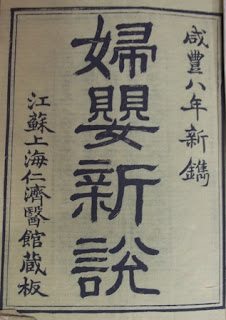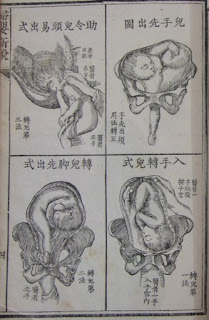Cataloguing the Fleetwood Churchill Collection
Dun's Library is currently running a program of library internships to give newly qualified librarians the opportunity to work with and catalogue part of the Library's collections of historical medical works. This is the report of the first intern, Catherine Ryan;
For six weeks during the summer, I spent time helping the RCPI to catalogue and classify the Churchill Collection, one of the many interesting collections of books held in the library. This collection was donated to the RCPI by Dr. Fleetwood Churchill, a prominent obstetrician and medical writer as well as a President of the College, known at that time as the King and Queen's College of Physicians in Ireland.

Fleetwood Churchill was born in Nottingham in 1808. His education began under the tutelage of his mother followed by an apprenticeship with a general practitioner in Nottingham and another with William Forbes, a surgeon in London. From there, he studied in Dublin, Paris and Edinburgh before returning to Dublin to study, practice and teach midwifery. In Dublin he led an active life in the medical profession, being involved in the opening of the Western Lying-in Hospital on Arran Quay and was a founder of the Dublin Sanitary Association. He also taught extensively, lecturing in midwifery in many of the schools of medicine and hospitals around Dublin, including the School of Medicine, Anatomy and Surgery, Digges St. (1833–4), at the Richmond Hospital School of Medicine (1834) (renamed the Carmichael School, 1849), and at Sir Patrick Dun's Hospital, which was located on Grand Canal Street in Dublin. In addition to teaching, he also published many books on obstetrics, gynaecology and pediatrics, which were widely consulted by students and practitioners alike and were translated into numerous languages. Churchill was elected an Honorary Fellow of the King and Queen's College of Physicians in Ireland in 1848, a Fellow of the College in 1851, and President in 1867 and 1868. He died in 1878.
 The Churchill Collection itself was bequeathed to the College by Fleetwood Churchill and it contains over six hundred rare books on obstetrics and gynaecology, as well as paediatrics and a number of other subjects. A number of Churchill's own publications can be found in the collection, including Outlines of the Principal Diseases of Females, which was originally published in 1838, later published as On the Diseases of Women in 1874. It includes also a few editions of his Diseases of Children, which is one of his best known works, and Essays on the Puerperal Fever and Other Diseases Peculiar to Women, published in 1849. These books have been translated in many languages with French editions of these works being found in the collection. The RCPI library also holds a Chinese translation of Dr Fleetwood's On the Theory and Practice of Midwifery. In addition to his own publications, the collection contains much of interest to those who wish to examine the works of other prominent medical writers such as William Smellie, the Scottish obstetrician and one of the founders of modern scientific obstetrics.
The Churchill Collection itself was bequeathed to the College by Fleetwood Churchill and it contains over six hundred rare books on obstetrics and gynaecology, as well as paediatrics and a number of other subjects. A number of Churchill's own publications can be found in the collection, including Outlines of the Principal Diseases of Females, which was originally published in 1838, later published as On the Diseases of Women in 1874. It includes also a few editions of his Diseases of Children, which is one of his best known works, and Essays on the Puerperal Fever and Other Diseases Peculiar to Women, published in 1849. These books have been translated in many languages with French editions of these works being found in the collection. The RCPI library also holds a Chinese translation of Dr Fleetwood's On the Theory and Practice of Midwifery. In addition to his own publications, the collection contains much of interest to those who wish to examine the works of other prominent medical writers such as William Smellie, the Scottish obstetrician and one of the founders of modern scientific obstetrics.

The collection would also be of interest to those studying the customs, manners and cultural mores surrounding pregnancy and childbirth as well as the attitudes towards women and midwives, both female and male, throughout the 17th, 18th and 19th centuries. As with any collection of historical medical books, alongside the pioneering work and foundational medical theories, there are also be examples of medical theories which are now, thankfully, debunked. One such example is Electricity as a Cause of Cholera and other Epidemics. This book, written by Sir James Murray and published in Dublin in 1848, argued against the notion of germs, instead blaming the cause of most diseases on electrical disturbances in the air!
Overall, the collection is a fascinating and valuable resource for the medical historian. For me, it was a great experience and I was delighted to have the opportunity to work with such an interesting collection and with all the people in the RCPI. I would like to thank Robert Mills, the librarian, Harriet Wheelock, the archivist, and all the ladies and gentlemen in the RCPI administration, both in Number Six and on Frederick Street for making me feel very welcome and a part of the team. For anyone interested in the history of medicine and medical practitioners in Dublin, I would heartily recommend a trip to the RCPI and a visit to the Heritage Centre there.
The RCPI Heritage Centre is open Monday to Friday from 10am-1pm and 2pm to 4pm, by appointment, to make an appointment please contact us. The library's online catalogue, including details of all the works in the Fleetwood Churchill Collection is currently undergoing essential maintenance, but will shortly be available again. In the meantime please contact the Librarian for enquiries relating to the collections. Images;
Portrait of Fleetwood Churchill by Sir Thomas Alfred Jones, from the RCPI Heritage Collections
Title page of the Chinese edition of On the Theory and Practice of Midwifery by Fleetwood Churchill, from the Dun's Library
Illustrations from the Chinese edition of On the Theory and Practice of Midwifery, from the Dun's Library
Footnotes;
1 Helen Andrews. "Churchill, Fleetwood". Dictionary of Irish Biography.(Eds.)James Mcguire, James Quinn. Cambridge, United Kingdom:Cambridge University Press, 2009. <http://dib.cambridge.org/viewReadPage.do?articleId=a1657> 2 Dunn, Peter M. "Dr William Smellie (1697-1763), the master of British midwifery" in Archives of Disease in Childhood. 1995; 72: F77-F78